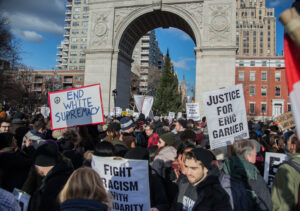
NYU students of color are struggling months after the murders of Ahmaud Arbery, Breonna Taylor, and George Floyd and having to face head on the cries of racial injustice that are sweeping the country and the backlash.
Sonali Burns, a junior, said that the heaviness of the murders didn’t impact her at first because she is used to hearing news like this as a Black woman.
“We’re almost desensitized to it because we know it’s gonna happen,” she said. “I don’t think the trauma fully hit me until my private school tried to make a statement and the statement basically said ‘All lives matter.’”
Munro Provine, a sophomore, didn’t leave his bedroom for two weeks due to depression. He even fought with his mother who he felt was not upset enough about the murders.
“I was like, ‘I really just don’t understand how you’re not okay with this or how you’re not upset when all these people are continuing to get murdered,’ and she said ‘You don’t know what I’ve been through, you don’t know what I grew up through, what I faced my entire life,’ basically saying she was so numb to it that she didn’t care anymore because she couldn’t,” he said.
Lizzie Diaz, a junior and a Latina said she was disheartened, but not shocked.
“I’ve been resigned to the fact that people of color are still considered second-class citizens, especially Black people, especially by the police force,” she said. “I was like ‘Oh, well, this is America.’”
Since the Floyd murder, many students of color don’t feel truly happy.
“I felt like I blended in more, I felt like I had more friends,” Burns said. “I wasn’t even thinking about it before. I think about race every day.”
Provine said he feels more aware of how he is perceived.
“I feel like if you’re a Black person in general, it’s something to be cognizant of because you need to know how people are gonna interpret you when they see you,” he said. “I try not to let that stuff bother me because what are you gonna do?”
Diaz’s mom is Mexican and her dad is a mixed-race Venezuelan, but even being light skinned has not shielded her from offensive comments
“I’ve been called a wetback,” she said. “I’ve been called a beaner.” she said.
Burns said it is hard to get some white people to understand what Black people are going through.
“My old teacher called me to tell me that I don’t know what it’s like to be a white woman in America right now because it’s really scary for her and there’s riots, Black Lives Matter is Marxist and it’s crazy,” she said. “Another person told me that racism isn’t real, it’s in my head.”
Provine said he had a two-hour long conversation with a high school classmate whose father is a policeman.
“For the most part we just didn’t agree and I understand why he would feel that way, his dad is a cop, he’s always gonna see him as a good guy,” he said. “Even sometimes those negative conversations or confrontations are good to have because I felt a lot better about the situation afterwards.”
Diaz said that even though she is not Black, she feels a special obligation to fight for the Black community.
“Black people are the most harmed by police brutality and by racism,” she said. “As someone who also unfortunately falls under that kind of oppression, but not as deeply, when I have moments to breathe, I should be speaking for the underdog, just as I hope someone would do for me.”
Whether the country will overcome racism is unclear.
“To be honest, I don’t really ever think America will get over racism,” Burns said.
But Provine is hopeful, as the country has changed in the past 100 years.
“Change doesn’t necessarily always have to be some big political thing, it doesn’t necessarily have to be laws changing, it could just be peoples’ temperament on a day-to-day basis,” he said.







